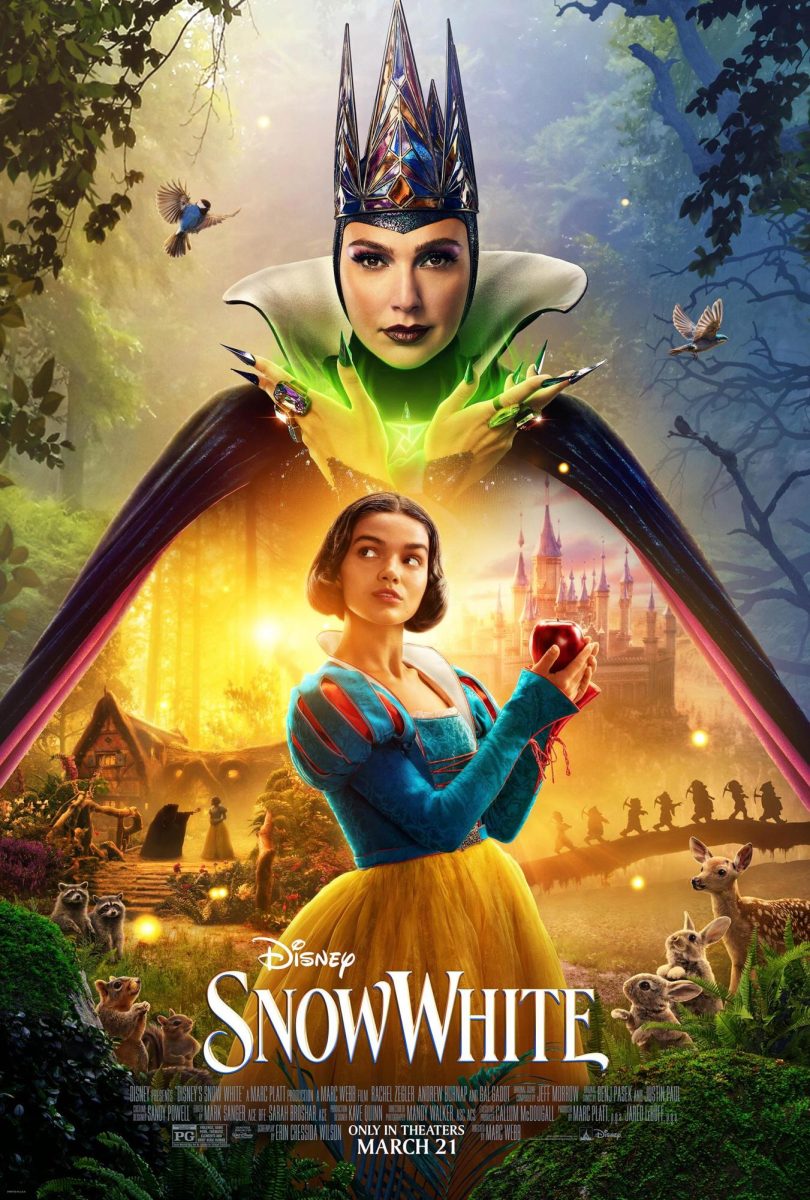British folk band Mumford and Sons originally formed in 2007, creating songs that defined a generation. Developing an iconic sound that mixed vocals with heavily arranged banjos and acoustic guitars, Mumford and Sons’ music is beloved and consistently replayed, but recent releases have strayed from their usual sound. They released their newest album, RUSHMERE, Friday, March 28, finally making their way back to the basics, and their fans couldn’t be happier about it.
Despite the name, the band is not a family business, with band members including Marcus Mumford (lead vocals, acoustic and electric guitar, drums), Ted Dwane (vocals, double bass, bass guitar), Winston Marshall (electric guitar, bass) and Ben Lovett (vocals, keyboards, piano). Their earlier music, including debut album Sigh No More (2009) and sophomore album Babel (2012), included now-iconic songs “I Will Wait” and “Little Lion Man,” which 2000s babies were practically raised by. The excitement, optimism, and family values found in their music built some of the ultimate campfire songs, and the Brits arguably built the West London folk scene.
The Mumford and Sons fandom fractured into pieces after the release of their 2015 album Wilder Mind, where the band took a wrong turn for a more electric, experimental, and heavily produced sound. This didn’t sit well with the banjo-loving and boot-stomping fans, causing reviews to decline and become scathing. The band tried to make a comeback with their 2018 album, Delta, where some of the beloved drumlines and acoustic guitar returned, but after its release, the band only continued to dissolve from the interior.
Guitarist Marshall departed the band in 2021 after some political controversy, and Marcus Mumford left for an attempted solo career. He released his own music in 2021 and 2022 without much success. After some time off and a switch of producers, Mumford and Sons, minus Marshall, announced RUSHMERE Wednesday, Jan. 15.

RUSHMERE brings the band back to its roots. The band changed producers again after the failure of Wilder Mind, which fans attribute to its producers, James Ford and Aaron Dessner. This time around, the band hired Dave Cobb, a producer known for his loose and “song-forward” approach to production that the band so desperately needed. It’s apparent in the newest albums’ sound, musically closest to their earliest works with just a touch of modernity.
Track one, “Malibu,” originally came out as the album’s second single Feb. 18, setting the tone for the rest of the album’s release in March. Filled to the brim with ghost and bird imagery and some almost Bob Dylan-esque lyricism, the song aches with grief and melancholy as the narrator hopes their late mentor will look down on them and be proud. The song builds to a hopeful and effervescent chorus, turning up the volume on the narrator’s story of growth and perseverance. Singing, “Walking through the valley was what brought me here / You are all I want / You are all I need/ And I’ll find peace beneath the shadow of your wings,” the instrumentals build into an almost worship-music finale.
Immediately followed up by track two, “Caroline,” is entirely back to the band’s roots, leaving heavily into the folk-rock genre and perfecting their mix of percussion and hoedown-worthy acoustic guitar. Singing “Caroline / You can go your own way/ But my face will follow you down / and fill your dreams,” the lyrics mock a female figure for her threats to leave the singer. The mix of the upbeat track and satirical lyrics paints a vivid picture of the end of a relationship, where the singer laughs through an argument with “Caroline,” calling her out for her crazy behavior, freeing the singer from his torment.
The album’s third track, “Rushmere,” the album’s namesake, was originally released as the album’s first single Jan. 17, dropping the first hints at the comeback of Mumford and Sons’ folk-rock era. Sounding musically a bit like a late-career One Direction hit, it perfectly represents the album’s core themes of not taking oneself too seriously and nostalgia for the days of youth. In “Rushmere,” Mumford creates a scene of late-night partying, with “wildness in the eye” and being “wasted in the dark,” creating vivid images of teenage shenanigans. With coordinated instrumentals that build to a show-stopping finale, complete with signature banjo and syncopated percussion, “Rushmere” is a standout on the album.
Track four, “Monochrome,” slows it down, bringing in just a touch of guitar riffing and piano. Mumford sings, “Hyacinth girl / You are peace / There is life in the ground beneath your feet,” and his message, combined with the track’s shorter length, displays a complex message about relationships that end slowly. “Hyacinth girl” references a 1922 poem by TS Elliot, “The Waste Land,” in which the speaker cannot verbalize his thoughts and feelings to his love, his Hyacinth Girl. “Monochrome” incorporates this tale’s message with heartstring-pulling instrumentals to subtly tell the listener that not all love is easy, not all monochromatic, and complexities can always get in the way.
Track seven, “Anchor,” takes another slow and winding beginning, heavier on the vocals. The song’s message takes on the album’s overarching theme of growing up and learning from your mistakes, honing in on a specific relationship the singer experienced. Mumford sings, “Oh, maybe I was wrong but baby, I was only young / I was trying to burn a hole in you with someone else’s sun,” suggesting how he was trying to be someone else in his relationship, how young naivete clouded his judgment. Arguably, it has some of the best lyricism on the album, but it is unfortunately overshadowed by the track’s repetitiveness, as the chorus and verse are just repeated twice and then end. Without closure or further development, this song feels out of place and unfinished.
The album’s final track, “Carry On,” brings back some lighter themes and brighter sound, finding the optimism the album needed to feel complete. However, despite the upbeat instrumentals, it thematically touches on more feelings of grief and emptiness, as Mumford sings “If this is what it’s like to be empty again / If this is what it’s like to be adrift.” But this is for good reason, as the rest of the song argues that this darkness is necessary because the best part of life is the fact that it’s real and raw, and one just has to “carry on.” This track is the perfect way to wrap up the album, almost acting as a fourth wall break, as the band will now “carry on” despite its controversy and past failures.
RUSHMERE is the perfect return for Mumford and Sons after their eight-year long break, returning them to their folk roots and raw lyrics, without the glistening polish of overproduction. Still slower and with significantly less banjo than their early works, the album is a step in the right direction for the band. With continuous themes tying the album up neatly in a coming-of-age-in-your-thirties bow, the album is successful in its comeback endeavors. Not yet perfect, however, in that some songs on the album seem rushed and unfinished, in the cases of “Anchor” and “Monochrome.” RUSHMERE as a whole earns a four out of five feathers, bringing Mumford and Sons back to their early successes, with some more room to grow.















